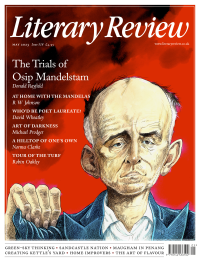Michael Burleigh
Tear Down These Peace Walls
How to Fix Northern Ireland
By Malachi O’Doherty
Atlantic Books 400pp £16.99
Over the three decades of the Northern Ireland Troubles, 3,568 people were killed and more than 47,000 others wounded. There is no exact figure for those left with PTSD, but it must be very high too. Cadaver dogs and ground-penetrating radar are still employed to help excavate the remains of victims of terror from decades ago.
The British like to boast of their skill in helping to negotiate the 1998 Good Friday Agreement (GFA) – a global template for resolving other conflicts, no less – rather than feeling ashamed about the duration and intractability of an intercommunal war in a province of the United Kingdom with about a quarter of the population of Greater London. The Stormont Assembly, the Northern Irish legislature established by the GFA, and modified by the St Andrews Agreement in 2006, has not sat for nine of its twenty-five years because one or other of the main parties whose participation is required for power-sharing to work has refused to compromise. The Berlin Wall only existed for twenty-eight years. So-called ‘peace walls’, isolating unionists from nationalists in Northern Ireland, have endured for half a century and their number has risen to around a hundred. Since the GFA, some 160 people have been killed in politically motivated attacks and last year alone there were over a thousand sectarian incidents. Even though education and housing remain segregated, we are told by Rishi Sunak that Northern Ireland is the best place in the world to do business and that significant inward investment in IT and engineering is heading its way. Unfortunately many of the local political elite are impervious to economic reality.
Malachi O’Doherty is a broadcaster, journalist and author with a deep knowledge of his home province. Being old-fashioned, he has tramped streets where the kerbstones are painted in the colours of the Union Jack or the Irish tricolour, and conducted many interviews with ordinary people as well as

Sign Up to our newsletter
Receive free articles, highlights from the archive, news, details of prizes, and much more.@Lit_Review
Follow Literary Review on Twitter
Twitter Feed
The son of a notorious con man, John le Carré turned deception into an art form. Does his archive unmask the author or merely prove how well he learned to disappear?
John Phipps explores.
John Phipps - Approach & Seduction
John Phipps: Approach & Seduction - John le Carré: Tradecraft; Tradecraft: Writers on John le Carré by Federico Varese (ed)
literaryreview.co.uk
Few writers have been so eagerly mythologised as Katherine Mansfield. The short, brilliant life, the doomed love affairs, the sickly genius have together blurred the woman behind the work.
Sophie Oliver looks to Mansfield's stories for answers.
Sophie Oliver - Restless Soul
Sophie Oliver: Restless Soul - Katherine Mansfield: A Hidden Life by Gerri Kimber
literaryreview.co.uk
Literary Review is seeking an editorial intern.